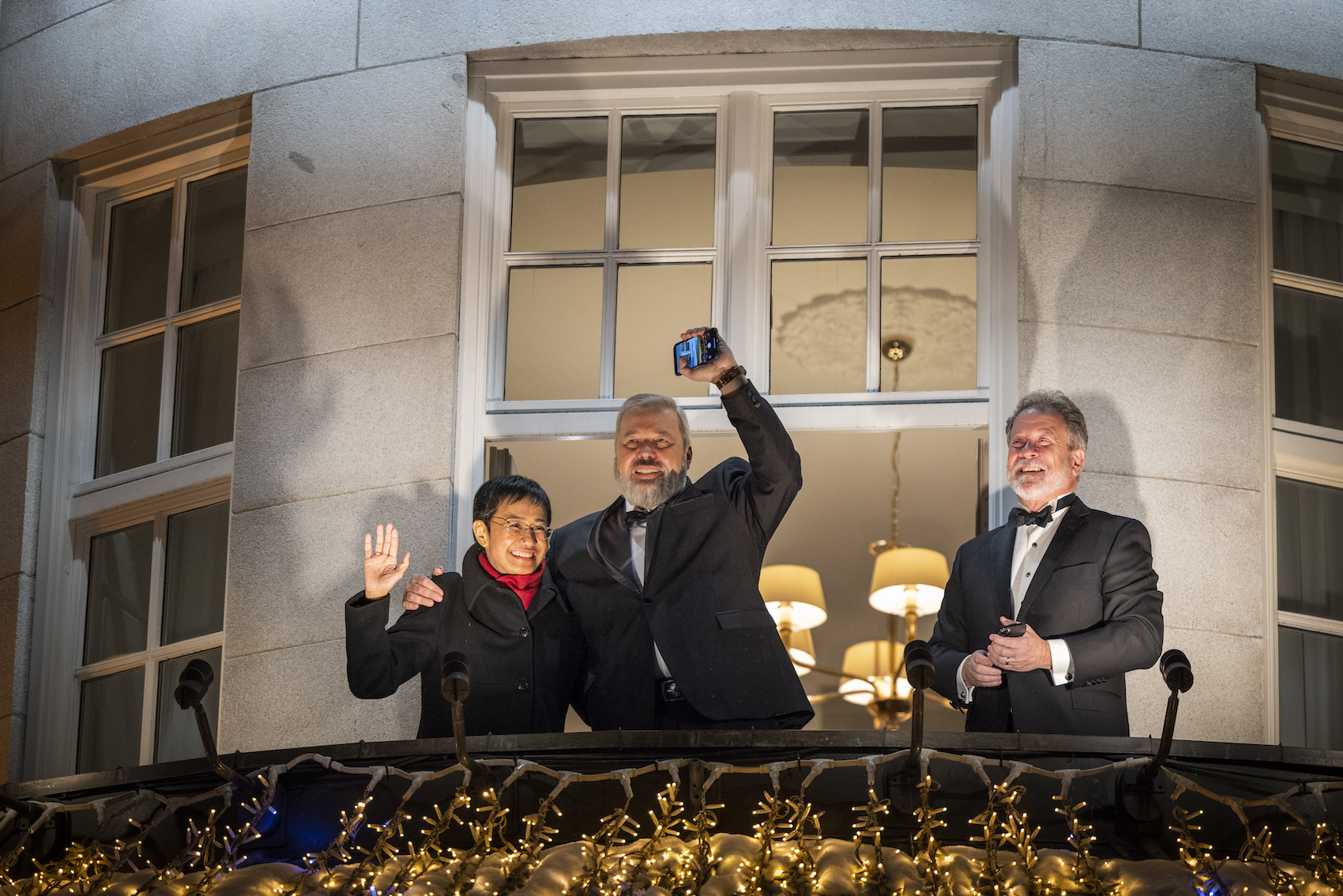
Journalists are under attack around the world. Last year, the number of journalists who were jailed for their work hit a record high of 293 according to the Committee to Protect Journalists. At the same time, the financial lifeblood of journalism — advertising — has shifted away from the press toward Big Tech companies whose algorithms promote content that enrages and entertains rather than informs.
Authoritarian regimes increasingly use this shifting information environment to their advantage by spreading lies and disinformation about their opponents while suppressing independent journalism.
But Maria Ressa has a plan for how journalists can restore a collective truth and societies can hold the tech platforms accountable for promoting falsehoods. Ressa is a journalist who was awarded the Nobel Peace Prize last year along with journalist Dmitry Muratov “for their efforts to safeguard freedom of expression, which is a precondition for democracy and lasting peace.”
Ressa was born in Manila and moved to the United States when she was 9 years old. After graduating from Princeton University, she returned to the Philippines and eventually began working as a correspondent for CNN, where she rose to bureau chief in Manila and Jakarta, specializing in terrorism coverage. She is the author of two books on terrorism: Seeds of Terror: An Eyewitness Account of Al-Qaeda’s Newest Center of Operations in Southeast Asia (Free Press, 2003) and From Bin Laden to Facebook: 10 Days of Abduction, 10 Years of Terrorism (Imperial College Press, 2013).
In 2012, she co-founded Rappler, an online news site that has exposed the violence of President Rodrigo Duterte’s war on the drug trade and his use of fake news to harass political opponents and manipulate the public. As a result, she became a government target, facing dozens of charges and arrest warrants. Her book How to Stand Up to a Dictator comes out later this year.
In our conversation, she describes how she wants to hold the tech platforms accountable while increasing investment in journalism. Our discussion, edited for brevity, is below.
They threw everything at me. There is one that alleges I’m a foreign agent, forget the fact that I’ve been a journalist for more than 36 years and that my track record is clean. There is also tax evasion, I have five of those, and cyber libel. But the real damage was what Duterte had already accomplished on social media, which was to tear down all journalists’ credibility so that there was no trust in the media.
In January 2018, the government tried to shut us down by revoking our license to operate. We fought back legally and publicly, but nevertheless within four months we dropped exactly 49 percent of our advertising revenue, so it became a do or die situation. We had to come up with an alternative business model to support ourselves.
I don’t think good journalism is going to survive without good tech, tech that isn’t about profit but instead about creating a public sphere where people can have public discussions and an exchange of ideas, things that are necessary for a democracy. The lesson I’d take out of this is that they can throw the kitchen sink at you, but it is all about how you handle it, and how you use it to make yourself stronger.
We need to hold them accountable for the amplification, make data uses more transparent, and take away the insidious manipulation. That’s where regulation needs to start. The EU has the Digital Services Act and the Digital Markets Act, which just last week went through. However, it’s taken two years to get here, and it’s not going to be out in time to help us with our elections.
Second, U.S. lawmakers need to reform or revoke Section 230 of the Communications Decency Act. The diddling around this has allowed people like me to lose our freedom. It has allowed people in Myanmar to die. Someone’s freedom of speech or ability to make more money has literally not just taken away others’ but has also led to death and destruction.
In the long term we need to look for an entirely new system for the internet. We need the checks and balances we have to extend to the digital world. There is only one world, and to pretend like the virtual world is something different is just a way for companies to continue making bucketloads of money at our expense. We are all victims of this insidious manipulation, and it must stop. Democracy is impossible if we do not have a shared set of facts
The goal of the International Fund for Public Interest Media is to help the Global South, where the worst damage by these American companies has been done. Helping independent media survive becomes critical in the Global South, where we don’t have the philanthropy you have here. Currently, only 0.3 percent of development funds go to the media. If we can raise funding to one percent, then you will give journalists a fighting chance.
Is it an uphill battle? Yes, but as more people begin to understand the impact of technology on our information ecosystems and on journalists, it is getting easier.
If facts lose in every country around the world — and that is what’s at stake — we will lose truth. Without truth, you can’t have trust. Without these, any shared human endeavor is impossible, and that includes democracy. I’m calling this an “Avengers Assemble” moment to try to get Filipinos to defend the facts.
I think we’re right on the edge globally of dropping into the abyss. We can still do this, but the time to fix it is getting smaller and smaller. The time to act is now.
Julia Angwin is editor-in-chief and founder of The Markup, which originally published this article. It is republished under the Creative Commons Attribution-NonCommercial-NoDerivatives license.